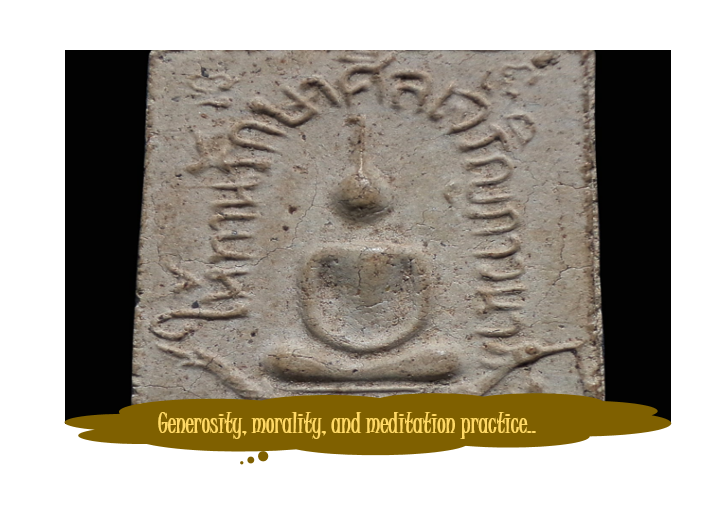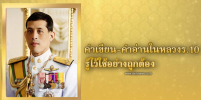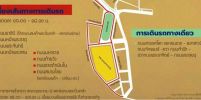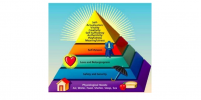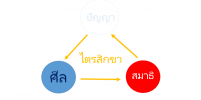Buddhism EP. 12 : Ten Wholesome Actions ???
The 10 Wholesome Actions have been divided into 3 ways of practice: generosity, morality and meditation practice. http://winne.ws/n25153
Let’s study together thru the conversation of the students who really need to know about “Buddhism”
Alan : Porn, last time you talked about
ten unwholesome actions and
their effects. What about
wholesome actions, how are they
classified?
Porn : Well, wholesome actions can be
explained in two ways. One way is
by avoiding the ten unwholesome
actions. That is, avoiding killing,
stealing, sexual misconduct and
the rest. The other way is by
doing wholesome actions;namely
generosity, good conduct,
meditation, humility, service,
sharing merit, rejoicing in others’
merit, listening to the Dhamma,
teaching the Dhamma, and
straightening one’s own views.
Alan : So, there are ten wholesome
actions altogether?
Porn: Yes, the second explanation is
known as meritorious actions.
These actions produce wholesome
effects. It is said in the Scriptures
that generosity results in
prosperity, listening to the
Dhamma and meditation practice
result in wisdom. The wholesome
actions have similar wholesome
effects.
Alan : Doing good always brings good.
Porn : Yes, you are right. The Buddha
also said: As one sows, so shall
one reap.
Alan : That sounds quite rational.
Porn : When one gets used to doing
wholesome actions, one will not
do otherwise for fear of evil
effects. Regarding the fruits of
wholesome actions, Buddhism
teaches us to pay attention to
giving. The more you give, the
less selfish you become, at the
same time you can help others
and society. The Buddha also
said, “Giving brings friendship”,
and “A giver is always beloved”.
Generosity will bring you
happiness in this life-time and
it will result in wealth in your
next life too. Actually, if one
was born wealthy, it is possible
for him or her to avoid unlawful
work or career. Such a state
should be conducive to a person’s
moral behavior.
Alan : How can one avoid doing
unwholesome actions and
always do wholesome actions?
Porn : It is recommended that regular
meditation practice and listening
to the Dhamma will make us
habitually do wholesome actions.
These two activities will result in
wisdom both in this lifetime and
in the next. They will be conducive
to our right view. Consequently,
we will realize what is right, what
iswrong, what is wholesome or
unwholesome, what we should
do or should not do. In short,
we can always refrain from
unwholesome actions.
Alan : You are saying that meditation
practice is essential for everyone,
aren’t you?
Porn : Yes, it’s a must. Alan, for practical
purpose, the ten wholesome
actions have been divided into
three ways of practice :
- generosity,
- morality and
- meditation practice.
Alan : Porn, I think that everyone wants
to be good. The persons who do
evil, maybe they are forced by
certain circumstances or
because of their ignorance.
Porn : This is why Buddhism teaches us
to associate with a wise man and
a good friend instead of fool or
a bad person.
Alan : It’s not easy for the poor to have
an opportunity to associate with
a wise man or a good friend
because most of them live in
bad surroundings.
Porn : From my experience, I have
found a lot of poor people who
behave morally and lawfully.
Conversely, I have found a large
number of rich people live their
lives immorally and unlawfully.
However, the one who was born
in a well-off family has a better
chance to go good than those
who were born in poverty.
Buddhism teaches that what we
have done in this lifetime will
condition our future existence,
do you remember that?
Alan : Yes, of course. Does this mean
that Buddhism believes in rebirth?
Do you believe so?
Porn : Yes, certainly. Alan, let me go
back to the wholesome actions
again. I believe that habitual
wholesome actions will protect
the doers from unwholesome
actions. It is the same concept
as there is no darkness in the
brightness.
Alan : I think so. Porn, it’s been
worthwhile talking about the
Dhamma with you.
Porn : Thank you.
Thanks & Regards : AJ S. Srisopa (Cr. All Dhamma teachers)

